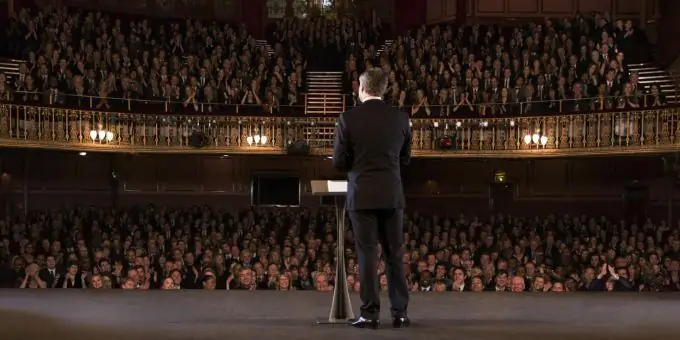- Author Evan Saunder saunder@psychicslog.com.
- Public 2023-12-17 04:58.
- Last modified 2025-01-24 13:57.
Many people get a lot of stress when they learn about the need to perform in front of an audience. Because of this, most speakers with certain psychological phobias often confuse words, use incorrect information concepts, and behave rather awkwardly on stage. This presents a person in the most unfavorable light for him and, in the end, spoils his reputation. Therefore, it is very important to work on public speaking skills and perceive them not as something difficult, but as an opportunity to share your ideas and views with the public.

Do not try to get rid of worries, as everyone, even the most advanced speaker, almost always experiences a slight anxiety before starting his speech. You just need to learn how to control your fear, transform negative emotions into positive ones, and be aware of what your problems are connected with. The very feeling of fear before the performance suggests that now you will be doing something unusual and important for yourself. Therefore, you should not try to get rid of it completely.
Prepare well for your performance. You must fully know your topic, the content that you present to a wide audience. In addition, you need to understand how best to present information so that the public appreciates it. Start working on your presentation in advance, because, as famous speakers say, one minute of a speech should account for at least one hour of fruitful work. Only in this case will the presentation be successful.
Find out in advance who your audience will be represented by. Before you start preparing to speak, ask for a list of all the participants. You must know who these people will be, for what purpose they will come to this event, what they want to get from it. In addition, in no case should presentations made for one type of audience be used for another audience. Focus on the individual goals and expectations of your listeners.
Try to set the atmosphere during your presentation, not a monologue, but a dialogue with the entire audience. To do this, it is best to take a few minutes before the start of your speech to get the audience in tune with you. You can exchange greetings, jokes, interesting data, which you will then begin to talk about in more detail in the presentation, and then the audience will begin to focus on you and take an active part in the dialogue.
If you do make a mistake on stage, then don't try to draw attention to yourself. There is no need to accentuate the mistakes made in front of the public, since all these people are probably not familiar with the information you have prepared. They are more likely to think that this is how it was planned, unless you start to panic.






